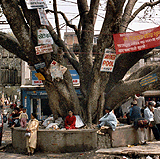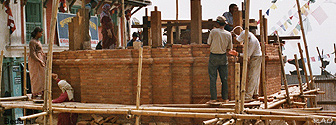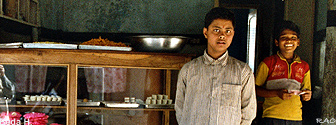 |
United
Nations
|
 |
|
Nepal's
Civil War: United Nations
|
|
OHCHR:
UN commission adopts Nepal rights resolution
|
April
19, 2005
 |
 |
A
Swiss resolution demanding that democracy and individual freedoms be re-established
in Nepal has been accepted at the United Nations in Geneva.
The
organisation's top human rights body accepted the resolution without voting
and called on Nepal to restore multiparty democracy and civil and political
rights suspended under emergency measures.
The
53-nation commission also accused Nepal's Maoist rebels of unlawful killings,
rape and recruiting large numbers of child soldiers. The commission called
on Nepal to "reinstate immediately all civil and political rights, to cease
all state of emergency related and other arbitrary arrests [and] to lift
the far-reaching censorship".
Urging
an investigation, it expressed concern at allegations of violations by
security forces, including "unlawful killings, all forms of sexual violence,
forced displacement and disappearances".
Swiss
representatives began talks about a resolution at the beginning of the
commission's annual six-week meeting on March 14. On April 10, the Nepalese
authorities and the commission agreed on the deployment of observers. According
to diplomats, government abuse intensified after the king declared the
state of emergency, accusing politicians of bickering amongst themselves
and failing to fight the Maoists.
Switzerland
dropped plans to censure Nepal after the accord. The Swiss had been leading
a group of donor nations demanding a report on human rights violations.
The Nepalese government has agreed that the office of the High Commissioner
for Human Rights should send observers to monitor respect for human rights
in the country and help bring abusers to justice.
Switzerland
is expected to provide financial and technical assistance to the observers
in Nepal, who should make their report at the commission's next session. |
 |
top
| OHCHR:
CONCERNED ABOUT SITUATION IN NEPAL |
News
Release February 08, 2005
 |
 |
The
following statement was issued today by nine United Nations human rights
experts, whose names appear below:
"We
are deeply concerned at the actions taken by King Gyanendra of Nepal to
dissolve the constitutional Government of Prime Minister Sher Bahadur Deuba
and to assume direct power; proclaim a nation-wide state of emergency and
suspend constitutional guarantees and civil and political liberties. We
express particular concern with regard to the wave of arrests and detentions
following the Royal Proclamation on 1 February 2005 of the state of emergency
and the King's takeover.
It
is reported that all members of the cabinet have been put under house arrest
and troops deployed around the homes of leaders of political parties. Fundamental
rights provisions contained in Articles 12 (2) (a), (b) and (c); Article
13 (1) and Articles 15, 16, 17, 22 and 23 of the Constitution of Nepal
have been suspended, including those enshrining the freedoms of opinion,
expression, association and assembly. The wave of arrests has spread from
top political leadership to upper and middle-level cadres and student leaders
who have been taken into custody at the Armed Police Force Headquarters
in Kathmandu. Human rights defenders and potential critics of the new regime
are also under threat and have, reportedly, either been arrested or gone
into hiding to avoid arrest.
According
to recent reports, media offices are being occupied. Military censorship
has been put into place in the written press and on the airwaves. FM radio
stations have been instructed to play music only. News bulletins transmitted
by other media are only allowed to contain information which originates
from the national security agencies. Phone lines and email systems running
through them have been cut.
The
wave of arrests and detentions and the actions against the media are a
serious setback for the country. Consequently, we call upon the Government
of Nepal to reaffirm the basic principles of the rule of law, democracy,
and supremacy of the Constitution, as well as to guarantee basic human
rights for all its citizens, including the right to life; to physical and
psychological integrity; to liberty; to security, and to the freedoms of
opinion, expression, association, assembly and movement. In particular
in the current context, freedom from arbitrary detention and the right
to petition the Supreme Court in habeas corpus proceedings should be scrupulously
respected.
We
consider that steps should be taken to reinstall democratic institutions
and to protect Nepalese citizens and their representatives; as well as
human rights defenders; journalists; lawyers and political leaders. In
addition, measures should be implemented to put an end to the climate of
impunity prevailing in the country for serious human rights violations,
crimes and abuses committed in the past."
The
experts are:
Leandro
Despouy, Special Rapporteur on the Independence of Judges and Lawyers;
Yakin Ertük, Special Rapporteur on Violence against Women, its causes
and consequences; Hina Jilani, Special Representative of the Secretary
General on Human Rights Defenders; Ambeyi Ligabo, Special Rapporteur on
the promotion and protection of the right to freedom of opinion and expression;
Manfred Nowak, Special Rapporteur on the question of torture; Diane Orentlicher,
Independent Expert to update the set of principles to combat impunity;
Rodolfo Stavenhagen, Special Rapporteur on the situation of human rights
and fundamental freedoms of indigenous people; Stephen J. Toope, Chairman-Rapporteur
of the Working Group on Enforced or Involuntary Disappearances; and Leïla
Zerrougui, Chairperson-Rapporteur of the Working Group on Arbitrary Detention. |
|
 |
top
|
HIGH
COMMISSIONER FOR HUMAN RIGHTS EXPRESSES CONCERN OVER DEVELOPMENTS IN NEPAL
|
News
Release February 01, 2005
 |
 |
The
following statement was issued today by United Nations High Commissioner
for Human Rights Louise Arbour:
"I
have learned with serious concern of the decision taken today by King Gyanendra
of Nepal to dismiss the Government of Prime Minister Sher Bahadur Deuba
and to assume direct power. I also understand that a state of emergency
has been declared, and that the members of the cabinet are under house
arrest.
Nepal
is already in the midst of a human rights crisis, which has been compounded
in recent years by the absence of a parliament and a democratically elected
Government. Democracy offers the most conducive environment for the promotion
and protection of human rights in any country. In his Proclamation to the
Nation yesterday, King Gyanendra emphasized his "belief that upholding
human rights not only preserves and promotes democratic values but also
enhances the way of life and civilisational values commensurate with the
twenty-first century". When I met the King during my visit to Nepal last
week, he reaffirmed his unequivocal commitment to human rights, democracy
and multiparty rule. Along with all other friends of Nepal, I now look
to His Majesty to live up to his stated commitment to these fundamental
principles, and ensure that the democratic institutions of the State are
reinstalled without delay. Nepal's vibrant civil society, especially its
human rights defenders and media, play a crucial role in the country's
quest for democracy. Their ability to continue their indispensable work,
freely and safely, must be ensured.
Finally
I wish to recall that Nepal is a party to all key human rights instruments,
and is as such obliged to ensure the enjoyment of the rights contained
therein by its people. The core of these human rights cannot be suspended
under any circumstances, not even during a state of emergency". |
 |
top
| Links |
 |
 |
 |
External
links |
|




